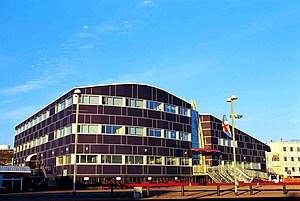
The Canadian territory of Nunavut holds general elections to its unicameral legislative body, the Legislative Assembly of Nunavut. Nunavut was created 1 April 1999 from part of the Northwest Territories, and its first election was held prior to division on 15 February 1999. Since the adoption of a fixed election date law in 2014,[1] general elections in Nunavut are held on the last Monday of October in the fourth calendar year following the last elections.[2]
Nunavut is divided into nineteen constituencies, each electing one Member of the Legislative Assembly (MLA). The number of constituencies has remained unchanged since the first general election. Nunavut uses consensus government in which there are no political parties. The Premier of Nunavut (and the cabinet) is directly elected by the MLAs, unlike most other provincial or territorial premiers, who are officially appointed by a Lieutenant-Governor or Commissioner on account of their leadership of a majority bloc in the legislature.[3][4]
In the electoral district of Akulliq, the 2008 election was delayed because of a legal battle that was brought forth by the former Member of Parliament Jack Anawak. Anawak filed as a candidate in the 2008 election but his application was rejected by Elections Nunavut because he had not lived in the territory for twelve consecutive months prior to the election.[5][6] After Anawak's case was dismissed by the courts, a by-election was held on December 15, 2008.[5] During the 2008 election, only two votes separated incumbent MLA Steve Mapsalak and his main challenger, former Northwest Territories MLA John Ningark.[7] As a result, a judicial recount was conducted, however this resulted in Ningark and Mapsalak each receiving exactly 157 votes, meaning that the election resulted in a tie. A second election took place three months later on March 2, 2009.[8][9] During the second election, John Ningark beat out his opponent Steve Mapsalak 193 votes to 179.[10] The 2008 election was also unusual in that one electoral district, South Baffin, saw no candidates nominated in time for the general election. A by-election was scheduled for 3 November 2008, with four candidates.[11]
No people have remained in office through the five general elections that have taken place in Nunavut.[12][13][14][15][16]
- ^ "Nunavut MLAs opt for fixed election dates, code of conduct". Nunatsiaq News, February 24, 2014.
- ^ "Nunavut Elections Act" (PDF). Elections Nunavut. Retrieved September 18, 2020.
- ^ "Frequently Asked Questions". Legislative Assembly of Nunavut. Archived from the original on 1 February 2010. Retrieved 28 October 2008.
- ^ "The role of the Commissioner of Nunavut". Commissioner of Nunavut. Archived from the original on 6 July 2011. Retrieved 30 May 2010.
- ^ a b "Anawak appeal nixes Akulliq election race". Canadian Broadcasting Corporation News. 7 October 2008. Retrieved 13 October 2008.
- ^ Incumbents shut out of Kivalliq region - Canadian Broadcasting Corporation. Retrieved 2010-01-11.
- ^ "Recount underway after close Akulliq byelection", cbc.ca, December 16, 2008.
- ^ "Akulliq by-election recount leads to tie". Canadian Broadcasting Corporation News. 8 January 2009. Retrieved 11 June 2010.
- ^ "Akulliq by-election recount leads to tie", cbc.ca, January 8, 2009.
- ^ "March 2, 2009 election results" (PDF). Elections Nunavut. Archived from the original (PDF) on September 20, 2009. Retrieved 2009-03-13.
- ^ "News release" (PDF). Elections Nunavut. 3 October 2008. Archived from the original (PDF) on 29 October 2008. Retrieved 13 October 2008.
- ^ Cite error: The named reference
election1was invoked but never defined (see the help page). - ^ Cite error: The named reference
election2was invoked but never defined (see the help page). - ^ Cite error: The named reference
election3was invoked but never defined (see the help page). - ^ Cite error: The named reference
election4was invoked but never defined (see the help page). - ^ Cite error: The named reference
election5was invoked but never defined (see the help page).
